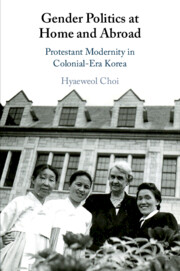
- Cited by 5
-
Cited byCrossref Citations
This Book has been cited by the following publications. This list is generated based on data provided by Crossref.
Song, Grace J. 2023. From Courtesan to Wŏn Buddhist Teacher: The Life of Yi Ch’ŏngch’un. Religions, Vol. 14, Issue. 3, p. 369.
Lee, Ji-Eun 2023. “I Am a Wanderer”: Paek Sinae (1908–1939) and Writing Travel. Sungkyun Journal of East Asian Studies, Vol. 23, Issue. 1, p. 95.
Choi, Hyaeweol 2023. Zen Buddhist Nuns Go Global: Temple Food in South Korea. Food, Culture & Society, Vol. 26, Issue. 3, p. 709.
Sebo, Gabor 2023. Continuity and Change in Asia. p. 513.
Lee, Janet Yoon-sun 2024. Science Education for Girls in Korea, 1886–1910. Sungkyun Journal of East Asian Studies, Vol. 24, Issue. 2, p. 213.
- Publisher:
- Cambridge University Press
- Online publication date:
- July 2020
- Print publication year:
- 2020
- Online ISBN:
- 9781108766838
- Subjects:
- East Asian History, Area Studies, Asian Studies, History


